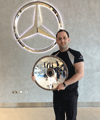April
A career in the fast lane

A Newcastle University student is living the dream after landing a job in Formula 1 with Mercedes AMG High Performance Powertrains (HPP).
Omid Mostaghimi, a PhD student in power electronics, is part of the world-class team responsible for designing the winning cars in the first four rounds of this year’s Formula 1 World Championships in Australia, Malaysia, Bahrain and China.
Employed as an electronics engineer, Omid’s handiwork is being used in eight cars in this year’s competition by four of the Formula 1 teams – Mercedes AMG Petronas, Sahara Force India, Williams Martini Racing and McLaren.
Looking forward to more success in the rest of the season, the 29-year-old says jobs don’t get much better than this.
"Can you imagine anything better than working for Formula 1?” says Omid.
It is the best learning challenge one could experience in real world cutting-edge technology and I feel very lucky to be here with such an amazing team.
My time at Newcastle University gave me a great grounding - there is a strong synergy between my PhD research project and the application of high temperature electronics which is what I’m doing here at Mercedes.”
Keith Ramsay, Omid’s manager at Mercedes AMG High Performance Powertrains, says: “This job is all about teamwork at the highest level. Timescales are short and we rely on excellent, 'right first time' engineering. Even though this is his first job outside academia, Omid has slotted right in to this culture and his specialist knowledge has been of immense benefit in our search for innovative solutions to our problems. In a short time, he has become a highly valued member of our team.”
Omid, who did his first degree at Isfahan University of Technology in Iran, joined Newcastle University in 2008 as a Masters student in the School of Electrical and Electronic Engineering and went on to become the school’s highest achieving masters student ever.
Going on to do a PhD in the Emerging Technology and Materials research group, Omid’s research focussed on extreme technologies, investigating the development of silicon carbide based DC-DC power converters for deployment in hostile environments. It is this knowledge and expertise which he has been putting into practice in his role within Formula 1.
Omid explains: “Formula 1 is introducing arguably the biggest set of rule changes in its history this season. Most affected are the engines.
The new regulations dictate a fundamental change from a normally aspirated V8 engine to a hybrid-electric turbocharged V6 power unit. I have been given the opportunity to design, integrate and maintain the power conversion electronics for the Energy Recovery System (ERS) of the Mercedes powertrain – basically harnessing energy from the turbo that would otherwise be lost as heat and improving the efficiency of the car.”
Newcastle University’s Dr Alton Horsfall, Reader in semiconductor technology and Omid’s former PhD supervisor, adds: “Omid was an outstanding researcher during his time as a student. It’s fantastic to see him doing so well and we are all just a little jealous of the job he’s doing!”
During his time at Newcastle, Omid also won several student awards sponsored by industry leaders and the Institute of Electrical and Electronics Engineers. He also won the prize for the best paper at a 2012 IEEE Power Electronics conference in the US.
published on: 30 April 2014
